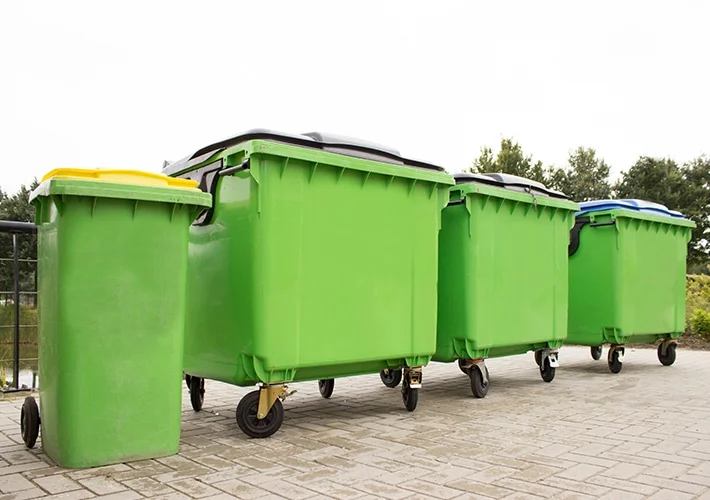Business Wheelie Bin Cleaning
Do You Clean Your Business Bins Legally?
Introduction
Wheeled waste containers (including ‘wheelie bins’) are commonly used to collect domestic,
commercial and trade waste; and materials for recycling. If you’re a company offering a wheeled
bin cleaning service you should carry out your work professionally and with appropriate
precautions. Contaminated wash water, rinse water, solid wastes and cleaning chemicals can
cause environmental pollution. You must follow legal requirements for wash water and solid
waste disposal if you’re doing this work as a business.

Legal background
The Environment Agency is responsible for protecting the water environment from pollution under
the Water Resources Act 1991 and the Environmental Permitting Regulations 2010 in England
and Wales. They have powers under the Environmental Protection Act 1990 to prevent
environmental pollution and harm to human health from waste management activities.
Most road gullies and rainwater drains carry surface water (rainwater) runoff directly to the
nearest river, stream or soakaway. If you allow wheeled waste container washings to enter these
drains or discharge onto unmade ground you could be causing water pollution, damaging wildlife
and contaminating drinking water sources. Causing pollution or making a discharge without a
permit is against the law with a maximum fine of £50,000 and/or 6 months imprisonment for cases
taken at a magistrates court.
The wash and rinse water you produce as a business (cleaning company or site owner) is legally
defined as a trade effluent. You must always get consent or enter into an agreement with your
local Sewerage Provider before you discharge trade effluent to any public sewer or to a private
sewer that connects to a public sewer. (Water Industries Act 1991)
You’ll need to dispose (and probably transport and/or store) the solid waste you produced from
your cleaning work. There’s a wide range of business waste legislation you’ll need to comply with.
Managing washings from wheeled waste containers
Wheeled waste container washings (wash and rinse water) may contain detergents, disinfectants
and waste residues which can all cause pollution. Don’t carry out washing in an area that drains
to surface water drains. You must discharge the washings to either:
• a foul sewer at a specified location at your own premises, with the agreement and
permission of your local Sewerage Provider, or
• an on-site sewage treatment system that is designed to deal with this waste and where the
system’s treated effluent discharge is covered by an environmental permit from us.
Customised vehicles are available for wheeled waste container cleaning and we recommend their
use. These carry their own water supply, collect and recycle the wash water. Contaminated
wash water can then be discharged to an agreed and permitted foul sewer connection at your
premises when the vehicle returns.
Residual waste
If you remove residual (left over) solid waste from bins or collect solid wastes screened from bin
washings and transport them for onward waste disposal, you will need to register for a
Waste Carrier to comply with legislation (The Control of Pollution (Amendment) Act 1989). You’ll
need to produce duty of care transfer notes for each waste movement. See NetRegs for more
information about waste transfer notes.
If you store any residual solid waste from your cleaning activities you may need a permit.
Good practice
- Before you start cleaning, empty any residual solid waste from the bin into a suitable bag. Add
any materials you use to clean the bin, such as wipes. Seal the bag and place it back into the
bin after cleaning. - Use as little water as possible to clean the container. Use collected rainwater as an alternative
source to mains water. - Use a customised cleaning vehicle or other equipment that recycles and/or the water for reuse.
This reduces the chances of causing pollution and the amount of washings requiring disposal. - Use as little detergent or disinfectant as possible to clean the container.
- Contain and collect all waste wash water and don’t let it discharge into any drainage system.
- Store all detergents and disinfectants safely. They should be kept indoors or in a store /
containment area, away from watercourses, open drains, gullies, or areas where water or other
liquids can soak into the ground. - Keep a suitable spill kit available to deal with any spills as soon as they happen. Produce a
spillage plan, test it and make sure you know how to use the equipment. - If you’re using a customised cleaning vehicle, only carry enough cleaning products for the job,
or a day’s work. Store and handle them carefully to prevent spillages. - Register for a waste carrier if you remove and transport any residual solid waste from
your customers site. - All solid waste must be disposed of legally at a permitted (licensed) waste management facility
or by an authorised company. - Keep wheeled waste containers out of direct sunlight to help reduce odours, fly nuisance and
general hygiene problems. - Keep bin storage areas clean and tidy and don’t leave any litter.
Don’t…
- Leave any litter or waste at the roadside.
- allow waste wash water, detergent or disinfectant to flow into road gullies, rainwater or surface water drains or onto open/unmade ground.
- make any unauthorised discharges to foul sewers.
- use more detergent or disinfectant than you need or let it drip off containers.
- take water from fire hydrants.
For more information regarding commercial bin cleaning, please head over to our commercial bin cleaning page. CLICK HERE
